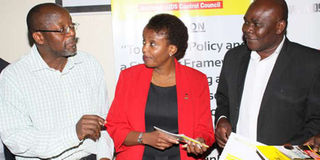Online hub launched to allow public access HIV/Aids research

Executive Director of NEPHAK Nelson Otwoma (right) with National Aids Control Council Director Nduku Kilonzo (centre) and Prof. Omu Anzala during a Maisha HIV/and AIDS Pre-conference briefing in Nairobi on April 16, 2015. Health ministry on April 25, 2016 launched an online hub to allow public access HIV/Aids research and information. PHOTO | ANTHONY OMUYA |
What you need to know:
The research hub dubbed Maisha Maarifa will also provide information on sexual and reproductive health.
Nearly 530,000 citizens are unaware that they have the virus.
Dr Cleopa Mailu said that the hub, the first in the region, avails a repository where data and abstract papers presented about the country can be available locally.
Kenyans can now take part in sharing their views on what the country needs to do to combat HIV/Aids in the country.
This is after the National Aids Control Council (NACC) launched an online based interactive site to enhance the public’s access to research and information about the strides the country has made in battling the disease.
The research hub dubbed Maisha Maarifa will also provide information on sexual and reproductive health.
It has a forum that allows interested people to hold debates, share their views and sentiments with the help of a moderator.
According to the experts, the hub will help to promote evidence-based policy formulation and programming for HIV, with a touch of what the public would like to see in the policies.
“This platform opens an avenue to the researchers and the public to interact and come up with concrete decisions which will enable us battle HIV,” said Dr Nduku Kilonzo, NACC director.
“This site will amalgamate information from the field.”
HIV TESTS
Currently, there are 1.6 million people living with HIV in the country, with about 596,228 on antiretroviral drugs (ARVs), according to data from the Kenya Aids Response Progress Report of 2014.
However, nearly 530,000 citizens are unaware that they have the virus.
Speaking at the launch, Cabinet Secretary for health Dr Cleopa Mailu said that the hub, the first in the region, avails a repository where data and abstract papers presented about the country can be available locally.
“We needed space to make all the HIV research proposals available to the public for informed decision making. It is always good to let the people see what we are doing,” said Dr Mailu.
The country’s ethical review board process an estimated 2,000 HIV research proposals monthly.
Dr Mailu said that the Hub will also provide updated information on ongoing HIV research to reduce duplication in protocol and proposal development among stakeholders.
“I believe that this hub will provide the much needed central location where studies done on HIV and related co-morbidities will be collected and availed publicly,” he added.
During the launch the researchers also called on the government to allocate more funds for research.
“Funding for research is still a big challenge which needs to be looked into. We need more funding,” said Dr Nduku Kilonzo.
But the minister said that the ministry has already put in place legal framework to implement a commitment to allocate at least two per cent of the national health budget to research.
The National Research Fund established under the Science and Technology Innovation Act, 2013 will facilitate research for the advancement of science, technology and innovation.
Kenya is signatory to the African Union’s protocol that oblige member states to commit at least two per cent of their GDP to support scientific research.
Before, allocation for research amounted to only 0.5 percent of the country’s GDP, an amount that was negligible compared to the country’s research needs and potential.





